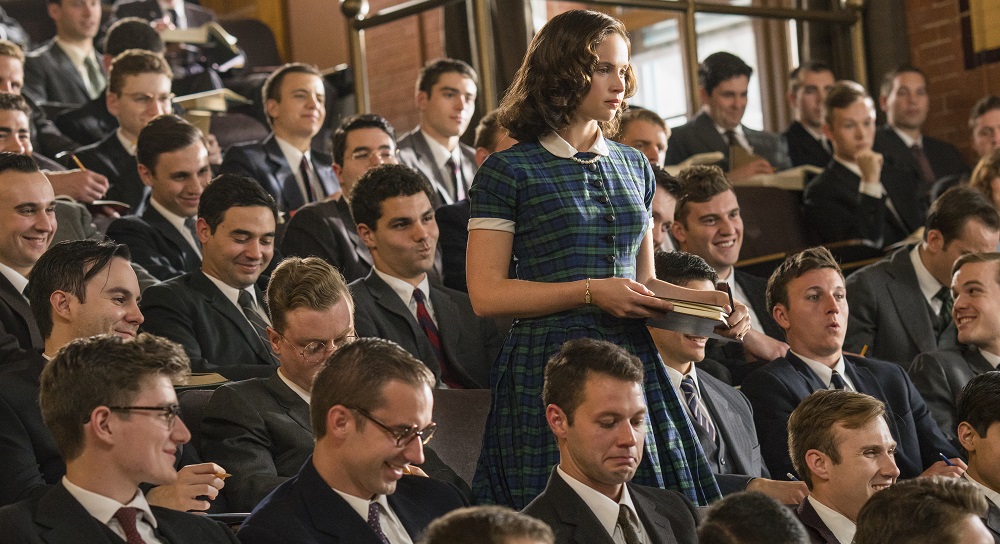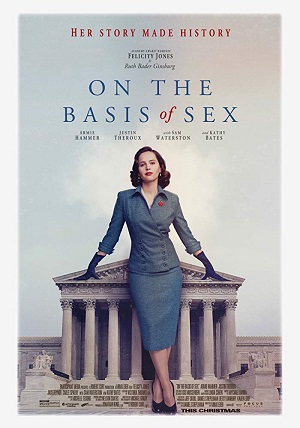
RBG Drama On the Basis of Sex a Rousing Success
Coming hot on the heels of Julie Cohen and Betsy West’s documentary RBG earlier this year, director Mimi Leder (Deep Impact) and Daniel Stiepleman unveil the drama On the Basis of Sex. This is an endearingly insightful feature chronicling roughly 15 years in the life of Ruth Bader Ginsburg (Felicity Jones) starting with her years at Harvard Law School and culminating with a landmark 1970 case where she, her tax attorney husband Martin (Armie Hammer) and the ACLU battled for the rights of a male caregiver taking care of his ailing mother but who was denied crucial tax deductions simply because of his gender. While moderately formulaic in narrative construction the film is still nonetheless a rousing story of selfless triumph and intimate self-reflection that only grows in powerful resonance as the story progresses. It’s very entertaining, and by the time the film had come to its conclusion all I wanted to do was to sit back down in the theatre and watch it against from the beginning right then and there.
What’s interesting is that as straightforward and conventional as the presentation might be, and even though he’s Ginsburg’s nephew, Stiepleman isn’t interested in presenting his aunt as some sort of saint or as an angelic embodiment of judicial perfection. While the future Supreme Court Justice is undeniably the hero that does not mean she still can’t make a few mistakes. She has to find her voice the same as any other person who ends up making a historical name for themselves also has to do, and more than that the movie goes to subtle, emotionally astute lengths to showcase that she just as importantly does not do this alone. The Ginsburg marriage is depicted as being one of equals, Ruth and Martin just as willing to challenge one another on questions of the law just as they are to be selflessly supportive of each’s personal ambitions. It’s spellbinding, and I find it difficult to imagine either of them would have risen to the heights they did without the other there to lend a helping hand.
Leder has inexplicably been in something akin to major studio directing purgatory after the failure of her 2000 melodrama Pay It Forward starring Haley Joel Osment, Helen Hunt and Kevin Spacey. Since then she’s mostly been working in television, helming a number of notable episodes for series like “The Leftovers,” “Shameless” and “Smash.” While her style is hardly flashy, there is a confident precision to her handling of key story dynamics that help give this film an endearing sense of authenticity that’s comforting. More important, Leder is aces with actors, the freedom she gives them to make each individual performance their own undeniable. This gives things an authoritative familiarity that’s reassuring, the majority of the characters, no matter how big or small their part in the story might be, pleasingly three-dimensional oftentimes in any number of fairly surprising ways.
But the core element is Jones. After a number of sensational performances in films as diverse as The Theory of Everything (for which she received an Academy Award nomination), Like Crazy, Rogue One: A Star Wars Story, A Monster Calls and Cheerful Weather for the Wedding, she’s delightful as Ruth Bader Ginsburg. With so much footage of the real woman it would have been incredibly easy for the actress to phone this one in, to rely upon the audience’s affinity for the Supreme Court Justice and deliver a spirited impersonation and call it a day. Instead, Jones goes for broke, attempting to get to the very heart of Ginsburg’s furious pursuit of gender equality and her dogged determination to battle discriminatory policies everywhere she sees it. There is a delicate yet still ferocious specificity to her actions that’s invigorating, everything culminating with her character’s empowered closing arguments during that 1970 tax discrimination case that are as poignantly human as they are breathlessly sincere.
I also loved what Hammer did here, his Martin Ginsburg a quietly supportive firebrand in his own right even if his temperament always seems to appear steady and nonplussed no matter what might be happening. Sam Waterston is masterful as Harvard Law School dean and future U.S. Government Solicitor General Erwin Griswold, while Stephen Root craftily steals any number of scenes as one of Ruth’s narrow-minded professors who will become her chief judicial foil less than 15 years after her graduation. There’s a feisty cameo from Kathy Bates as barrier-busting lawyer and feminist icon Dorothy Kenyon, a scene between her and ACLU legal department head Mel Wulf (Justin Theroux) particularly winning. Best of all might just be Cailee Spaeny as Ruth and Martin’s headstrong and independent daughter Jane, her scenes with Jones having a magnetic electricity that’s credibly multifaceted.
I can’t say On the Basis of Sex goes anywhere surprising. I can’t say Stiepleman’s script digs down any deeper than it needs to in order to edify or to entertain. But none of that makes the film any less rapturous. Leder directs things with an assertive hand, the technical proficiency of her drama never in doubt especially as it pertains to cinematographer Michael Grady (Annie), editor Michelle Tesoro (Shot Caller), Oscar-winning composer Mychael Danna (Life of Pi) and costume designer Isis Mussenden (The Wolverine). The film is also a magnificent showcase for Jones, the talented actress giving one of the best performances of her career, making this examination of Ruth Bader Ginsburg’s early judicial exploits a rousing success I couldn’t help but love.
– Review reprinted courtesy of the SGN in Seattle
Film Rating: 3½ (out of 4)








